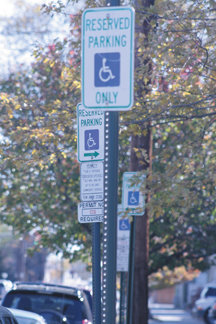Each month, the City Council passes ordinances to give specific handicapped parking spots to residents who apply. If a person meets the state set criteria, the city is required to give them a space, said Police Chief Robert Kubert.
“It’s pretty routine,” he said.
An applicant must provide a doctor’s certificate attesting to the disability. Then, local police go out and measure a spot and put up two signs designating a 22-foot space that no one but the registered vehicle can use – even when the applicant is a renter.
“The law does not make a distinction between tenant and property owner,” said Councilman Joseph Hurley after touring one of the proposed sites on West 30th Street, where several residents have objected to the location of a proposed handicap spot.
“The law does not make a distinction between tenant and property owner.” — Joseph Hurley
________
George Burns appeared before the City Council meeting on Nov. 10 to object to a proposed location in front of his residence on Avenue E, saying the rules for assigning the parking spaces are not fair to the homeowners.
The person seeking the spot was rejected for the spot on the original application, but granted the spot after an appeal.
“This spot takes up two spaces in front of a five-family building, and it’s not fair,” Burns told the council.
Councilman Ray Grieves said the law was clear and that if a person qualified for the space, the city had to provide one. Under the law, it has to be the closest spot.
Investigating
Kubert said when a request is made, the police department investigates to see if a person qualifies – which requires an examination by a police department-approved doctor.
“Then we measure the spot,” Kubert said. “It has to be 22 feet long and within 150 feet of the person’s residence.”
Council President Terrence Ruane said violating the provisions of the state law could put the city at risk of a lawsuit if a disabled person is injured as a result. He said if the city locates a spot farther away and the person falls, the city is at risk. The city, he said, is already in litigation over a similar circumstance.
Hurley said the city also tries to avoid deviating from the standard to avoid constant negotiations over locations.
“We get hundreds of these,” he said “If we waver on the process, we’ll wind up with chaos.”
Residents from West 30th Street also noted that the proposed handicap spot was not in front of the disabled person’s home, and pointed to confusing lines painted in the street denoting driveways.
Kubert said he would revisit both locations to see if something can be done to modify the impact, such as relocating the Avenue E spot to keep it from taking two spots. He said he will also look at West 30th Street to see if the proposed spot can be moved in front of the person’s house.
“The location, however, might be too small,” he said.
City officials admit that streets have more handicap parking spots than other locations, but overall, the number hasn’t dramatically increased.
Budget for business district cut
At a recent council meeting, the City Council passed the annual budget for the Town Center Management Corporation, but not without some comments from the public. The City Council approved a $317,000 operating budget for the Special Improvement District, down from $382,000 last year.
Special Improvement Districts provide more centralized, more professional marketing and promotion techniques in a move to coordinate the efforts of the business community to compete against other retail interests, such as shopping malls. From establishing the district to choosing and funding neighborhood services and improvements, the goal is to increase these businesses’ “bottom line.” Districts also allow merchants to lobby for city services as a group rather than as individuals, thereby facilitating improvements in commercial corridors.
In Bayonne, the Town Center manages the day-to-day operations of the district between 17th and 30th streets along Broadway.
Ellen Colasurdo, owner of Advanced Photo, however, said she had attended the recent focus group for the Town Center, and said that prospects for Broadway are even bleaker this year than two years ago.
“Once the new mall opens, we’re going to see tumbleweeds on Broadway,” she said, suggesting that the Town Center’s budget can be cut more if the $29,000 annual rent for its offices is eliminated by moving operations into an office in City Hall instead.
She said the funds might be used for a campaign to help bolster Broadway businesses.
“There is no campaign yet,” she said, urging the council to push for these changes.
Chief Finance Officer Terrence Malloy said the Town Center does not need council approval to make changes in the budget.
Hurley said monthly meetings are not well attended, which would be the venue for making changes.
However, Colasurdo said the meetings are held at 8:30 a.m.
“Some of us can’t attend them,” she said.
Council President Terrence Ruane said these might be modified to accommodate business owners.
Al Sullivan may be reached at asullivan@hudsonreporter.com.
